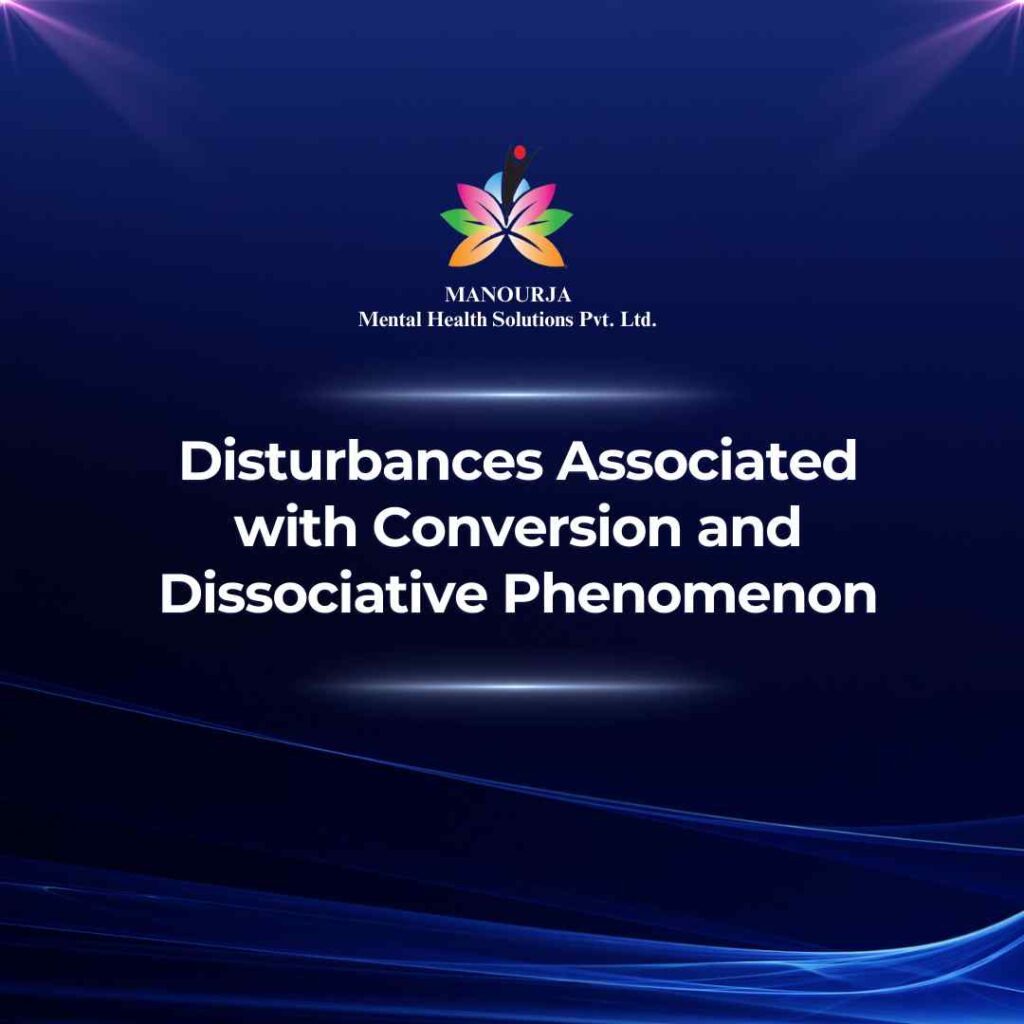Disturbances Associated with Conversion and Dissociative Phenomena

Disturbances associated with conversion and dissociative phenomena refer to a range of psychological symptoms where mental distress is expressed through physical symptoms or a disruption in consciousness, memory, identity, or perception. These disturbances are typically the result of severe psychological stress or trauma.
Conversion Phenomena
Conversion phenomena involve neurological symptoms that cannot be explained by medical conditions. These symptoms often occur in response to psychological conflict or stress and can include:
- Paralysis or Weakness: Sudden loss of ability to move a limb.
- Sensory Loss: Numbness, blindness, or deafness without a physical cause.
- Seizures: Non-epileptic seizures or convulsions.
- Motor Symptoms: Tremors, tics, or difficulty walking.
Dissociative Phenomena
Dissociative phenomena involve a disruption in consciousness, memory, identity, or perception, leading to a disconnection from reality. Key dissociative symptoms include:
- Amnesia: Inability to recall important personal information.
- Depersonalization: Feeling detached from oneself.
- Derealization: Feeling that the environment is unreal.
- Identity Confusion: Uncertainty about who one is.
- Identity Alteration: The presence of two or more distinct identities or personalities.
Disturbances as Signs and Symptoms of Mental Illness
These disturbances can be seen as signs and symptoms of several mental health disorders. They often indicate an underlying issue that requires comprehensive psychological and sometimes medical intervention.
Mental Illnesses Where These Disturbances Are Present
- Conversion Disorder (Functional Neurological Symptom Disorder)
Conversion Disorder is characterized by neurological symptoms (e.g., paralysis, blindness) that are inconsistent with medical or neurological conditions but are linked to psychological factors. These symptoms are real and cause significant distress or impairment.
- Dissociative Amnesia: Characterized by an inability to recall important personal information, usually related to trauma or stress.
- Dissociative Identity Disorder (DID): Formerly known as multiple personality disorder, DID involves the presence of two or more distinct personality states.
- Depersonalization/Derealization Disorder: Involves persistent feelings of detachment from oneself (depersonalization) or the surroundings (derealization).
- Post-Traumatic Stress Disorder (PTSD)
Individuals with PTSD may experience dissociative symptoms such as flashbacks, depersonalization, and derealization as part of their response to traumatic events.
Similar to PTSD, Acute Stress Disorder can involve dissociative symptoms that occur immediately after a traumatic event and can last from three days to one month.
People with Borderline Personality Disorder may experience transient, stress-related dissociative symptoms, such as feeling disconnected from themselves or their surroundings.
- Somatic Symptom Disorder
In Somatic Symptom Disorder, individuals focus excessively on physical symptoms, such as pain or fatigue, which are not fully explained by a medical condition. This can include conversion symptoms.
While not primarily a dissociative disorder, individuals with Schizophrenia might experience symptoms like depersonalization and derealization, especially during acute episodes.
- Major Depressive Disorder (MDD) with Psychotic Features
Severe depression can sometimes lead to dissociative symptoms, particularly when accompanied by psychotic features such as hallucinations or delusions.
Conclusion
Disturbances associated with conversion and dissociative phenomena are complex and often severe symptoms that point to underlying psychological stress or trauma. Recognizing these disturbances is crucial for the diagnosis and effective treatment of various mental health disorders, ensuring individuals receive the appropriate care to address both their psychological and physical symptoms
At MANOURJA, we believe in the transformative power of counseling. Our experienced therapists offer a safe and supportive space where you can explore your thoughts, emotions, and challenges. Through personalized counselling sessions, we’ll work together to develop coping strategies, build resilience, and achieve lasting positive change. Discover the path to a healthier, happier you with MANOURJA counselling services.
MANOURJA Rehabilitation Services
At MANOURJA, we’re dedicated to helping you in rebuild your life, after difficult times. Our rehabilitation services focus on understanding what you need to move forward, whether you’re recovering from addiction, trauma, or any psychological – social challenges. We create personalized plans, that are all about helping you, regain your strength and find hope again. With a caring team by your side, you’ll have the support to make real progress and take steps toward a brighter, healthier future.
